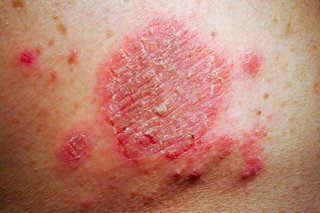A Little Piece of Skin Flakes Off and I Have a Red Dot Again
Discoid eczema, also known as nummular or discoid dermatitis, is a long-term (chronic) peel condition that causes peel to become itchy, swollen and cracked in circular or oval patches.
Without treatment, discoid eczema can last for weeks, months or even years. It may also keep coming back – often in the same area that was affected previously.
Symptoms of discoid eczema
Discoid eczema causes distinctive circular or oval patches of eczema. It can affect whatever office of the body, although it does not usually affect the face or scalp.

The showtime sign of discoid eczema is usually a group of modest spots or bumps on the peel. These so chop-chop join up to course larger patches that can range from a few millimetres to several centimetres in size.
On lighter skin these patches volition be pink or red. On darker peel these patches can be a nighttime brown or they can be paler than the pare around them.
Initially, these patches are often swollen, blistered (covered with small fluid-filled pockets) and ooze fluid. They also tend to be very itchy, peculiarly at nighttime.
Over time, the patches may become dry, crusty, cracked and flaky. The centre of the patch also sometimes clears, leaving a ring of discoloured pare that can be mistaken for ringworm.
You may but have 1 patch of discoid eczema, only almost people become several patches. The skin betwixt the patches is often dry.
Patches of discoid eczema tin sometimes become infected. Signs of an infection can include:
- the patches oozing a lot of fluid
- a yellowish crust developing over the patches
- the peel around the patches condign hot, swollen and tender or painful
- feeling ill
- feeling hot or shivery
- feeling unwell
When to seek medical advice
See a pharmacist or GP if y'all think you may have discoid eczema. They can recommend a suitable treatment.
You should also seek medical communication if you think your skin may be infected. You may demand to utilise an antibiotic cream or, in severe cases, have antibiotics equally a tablet or capsule.
A GP should be able to make a diagnosis just by examining the afflicted areas of skin. In some cases they may also ask questions or conform some tests to rule out other weather condition.
A GP may refer yous to a doctor who specialises in skin conditions (dermatologist) if they're unsure of the diagnosis or if you need a patch exam.
Causes of discoid eczema
The crusade of discoid eczema is unknown, although it may happen equally a event of having particularly dry out peel.
When your skin is very dry out it cannot provide an effective bulwark against substances that come into contact with it. This could permit a previously harmless substance, such as soap, to irritate your pare.
It's of import to wait carefully at all the chemicals in cosmetics and toiletries that may have come into contact with your skin. Contact dermatitis, a type of eczema acquired by coming into contact with a particular irritant, may have a function in discoid eczema.
Some people with discoid eczema besides have a history of atopic eczema, which often happens in people who are prone to asthma and hay fever. However, unlike atopic eczema, discoid eczema does non seem to run in families.
Other possible triggers
An outbreak of discoid eczema may sometimes be triggered past a minor skin injury, such as an insect bite or a fire.
Some medicines may also be associated with discoid eczema, as patches of eczema tin can appear in people taking:
- interferon and ribavirin – when they're used together to care for hepatitis C
- tumour necrosis factor-blastoff (TNF-blastoff) blockers – used to care for some types of arthritis
- statins (cholesterol-lowering medicine) – which can cause dry out pare and rashes
Dry environments and cold climates tin can make discoid eczema worse, and sunny or clammy (humid) environments may make your symptoms better.
Treating discoid eczema
Discoid eczema is unremarkably a long-term problem, simply medicines are bachelor to help salve the symptoms and keep the status under control.
Treatments include:
- emollients – moisturisers applied to the skin to terminate it becoming dry out
- topical corticosteroids – ointments and creams containing a steroid that are applied to the skin and may salve severe symptoms
- antihistamines – medicines that can reduce itching
There are also things you tin do yourself to help, such as avoiding all the irritating chemicals in soaps, detergents, chimera baths and shower gels.
Additional medicine can be prescribed if your eczema is infected or especially astringent.
Occasionally, areas of skin affected past discoid eczema tin be left permanently discoloured after the condition has cleared up.
Notice out more near treating discoid eczema.
Other types of eczema
Eczema is the name for a group of peel conditions that cause dry, irritated skin. Other types of eczema include:
- atopic eczema (also called atopic dermatitis) – the almost common type of eczema, information technology oft runs in families and is linked to other conditions such as asthma and hay fever
- contact dermatitis – a type of eczema that happens when the skin comes into contact with a item substance
- varicose eczema – a blazon of eczema that usually affects the lower legs and is caused past problems with the menses of blood through the leg veins
Page last reviewed: 30 October 2019
Next review due: 30 October 2022
Source: https://www.nhs.uk/conditions/discoid-eczema/
Post a Comment for "A Little Piece of Skin Flakes Off and I Have a Red Dot Again"